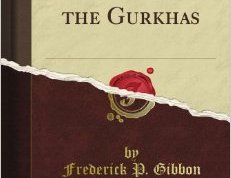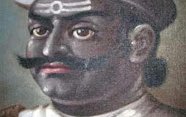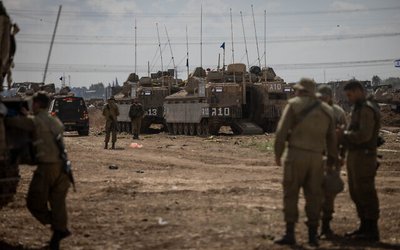
The book A Prisoner of the Gurkhas (London: George Routledge & Sons Ltd, 1904) is one of the few books written by Frederick P. Gibbon on British India, the Mutiny and army related stories.
The book starts with conversation between Margaret Upton, a young lady and Ensign John Collingwood Russell of England's 162nd Foot Regiment, just gazetted at that time. Jack Russell, his son aspiring to join “the profession of arms,” had reached sixteen and they were celebrating at Claydon Manor House on the latter’s birthday, before parting to take off for his profession. The book is about Jack Russell’s adventure in India, his initial suspicions about the Gurkhas, and more particularly his experience with them. Russell fought in the Anglo-Nepalese War against Gurkhas under the command of Colonel Balbhadar Sing, and eventually, after some ruses of war and bitter experience, became a friend of Nepalese. The bond that developed was incredible.
In the beginning, Jack Russell had little or no knowledge about Nepal. He gradually came to know that this country contained the highest mountains of the Himalayas, and was ruled by "a barbarous tribe known as Gurkhas or Gurkhalis." These Gurkhas were taken as local imperialists as they had conquered the territories in their vicinity and were extending their country in every direction. The British in India, who were already consolidating themselves, were concerned because Gurkhas were also encroaching what they thought were British territories. Further, they thought "their [Gurkhas] aggressions grew from bad to worse and they mocked at the British threats."
Frederick P. Gibbon, the author of this book, clarifies about the unfolding scenario when he talks about the events leading up to the British Police Post attacks. Gibbon states that, subsequent to the Police Post attack, which killed British Army personnel, the officers and men of the 162nd were in a fever of excitement as they felt insulted. The mood in the camp read that the enemy must be wiped out at any cost. Gibbon further writes that the British were “eager as any to punish the “cheek" of these parbattias.” Subsequently, the retaliation was led by General Robert Gillespie from Saharanpur into the territory occupied by the Gurkhas with 3,500 men. General Gillespie was accompanied by Jack Russell. A bad luck, General Gillespie, though a trained commander, was killed by the Nepalese bullet at Kalunga no sooner the Anglo-Nepal war had begun.
Describing the initial response, Gibbon comments that the British "were all under the delusion that their progress would be simple and that little opposition would be attempted against so large a force as theirs. To their manifest surprise, therefore, they found that the enemy had not the slightest intention either of surrendering or of retiring.” Colonel Balbhadar was asked by the British to surrender which was denied by him ‘defiantly.’
Jack Russell was arrested by the Gurkha armed guards led by Jaspao Thapa while he was on a mission together with one colleague, and passing through a jungle. He was immediately taken in as captive to extort war related information of the British side while his colleague was able to escape. While in custody, Russell was taken from one place to another as his captors wanted. There he got the opportunity to know Gurkhas, their lifestyle, military acumen, faith and sturdy character. This proximity gradually helped them understand each other, and experience their virtues and common interests. This interesting encounter between them has been described as follows:
"Come out, you Englishmen," commanded the Gurkha officer in Hindustani not much better than Jack's." Come out, and we won't kill you." This officer was a small thick-set fellow, very strongly built.
"You stay where you are," retorted the ensign scornfully, "or we will kill you."
"You cannot escape; we're six to two, and we do not wish to kill brave men."
"I want to know what you are doing here," the little highlander eplied." You carry a message, and I must know what that message is."
"But who are you ? Think you that we shall give the letter to the first that asks?"
The young Gurkha haughtily drew himself up to his full height of five feet two inches. " I am Jaspao Thapa, son of the great Amar Sing."
Now all the English soldiers had heard of the brave old lion, General Amar Sing Thapa, commandant of the Gurkha forces, and of his son Ranjur, who was defending Jytak fort so pluckily against them.
"Is that true?" said the ensign slowly. "We are indeed fortunate to have fallen into the hands of so distinguished a soldier. But I cannot give you any letter; there is no letter here."
"Come out at once or we slay you both," was the quiet reply, and Jack recognised the tone of one who meant what he said.
"Grant us a moment for consultation," he requested, and pretended to confer with his companion.
"That's enough," ordered the officer at length; "come out." Ensign Russell slowly emerged from the bushes.
"Come out, you other Englishman," shouted Jaspao, but no one stirred.
Further, there is an interesting reference in the book about General Amar Singh Thapa. Gibbon writes, Amar Singh was of the belief that Englishmen and Gurkhas “ought to be good friends and allies.” Moreover, acknowledging their own shortcomings, Amar Singh was optimistic that upon an emergence of a “sagacious” leader, the two nations could indeed enjoy a cordial relationship. Despite his desire for friendship, Amar Sing did reiterate that any attempts to compromise the sovereignty of Nepal would be met with a “fight to the death.”
As events unfolded, Amar Singh’s wishes were indeed destined to be fulfilled. Gibbon writes that "Many years later a great statesman and warrior did rise up to rule Nepal, and usurper and intriguer though he was, stained with the vices of the Nepal court, he piloted that kingdom safely through the troublous times of the Great Mutiny.” He aided Sir Colin Campbell to capture Lukhnow, drove out the enemies of Britain seeking refuge in Nepal and established a cordial relationship with the imperialist neighbors. Moreover, Gibbon showers him with superlatives and introduces him as, “the mighty Shikarri, the greatest slayer of tigers since the world began, the Maharaja Sir Jung Bahadur, Prime Minister of Nepal."
In addition, Frederick P. Gibbon describes many touchy instances of the Gurkhas in this book. The famous expression of Jaspao Thapa “Katar hunnu bhanda manru ramro" [it is better to die than to be a coward] finds its place in the book with all required focus." In Bhurtpore campaign, during the Indian mutiny, Gurkhas fought shoulder to shoulder with the British, arousing a sense of solidarity for the future. This solidarity, the author notes, “lasted ever since.”
This is an exciting book describing the adventure of Jack Russell. The author has taken liberty of going beyond in his depiction of the Gurkhas, making it further exciting. The book immensely helps readers know about many aspects of Nepal and Nepalese in the understanding of the British.
















